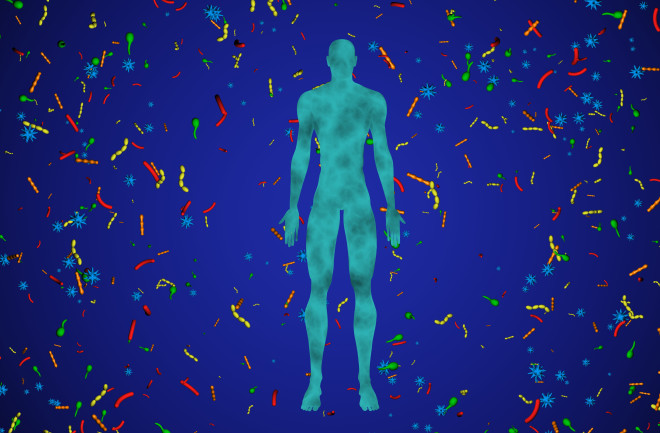The bacteria writhing around in our guts likely play a role in inflammatory bowel disease, obesity and other health conditions. And we swap bacteria with the people we interact with. So maybe it’s possible for gut bacteria to transfer those health conditions among people, too.
That’s the conclusion reached in a new opinion article in the journal Science. Maybe diseases typically considered “noncommunicable” — ones like diabetes or asthma that don’t have viruses or bacteria hopping from host to host — actually slink between patients via gut microbes. Scientific proof that gut bacteria move among people initiating these illnesses would be hard to get. But if the theory is correct, it would be a whole new angle of disease research for scientists to tackle, says article co-author Brett Finlay, a microbiologist at the University of British Columbia.
Our guts teem with thousands of bacteria species that help us digest food, produce nutrients and build up an immune system. Genetics determine little of what’s growing in our intestines, says Finlay, whose writing was supported by the Canadian Institute for Advanced Research, a nonprofit supporting cross-disciplinary research. Most of what thrives down there comes from our environment — what we eat, where we live and how we interact with our surroundings. Who we interact with plays a role, too, his article explains. Spouses share more similar gut microbes than siblings who live far apart — and, in at least one instance, microbiomes alone have indicated who is married to whom.
Recent research has even found that as people change who they interact with, they develop some of these traditionally noncommunicable diseases. For example, U.S. military families stationed in nations with a higher average body mass index have higher BMI scores, and those stationed in low-BMI countries have low scores. Those living in India have low rates of ulcerative colitis — but migrants to the U.K., U.S. or Canada have higher rates of the disease. Some research suggests that merging health conditions with those around you is a byproduct of lifestyle and diet changes.
But if gut bacteria play a role in these health conditions, then people are possibly gaining more than new knowledge and foods from new friends — maybe they’re taking on some of their bacteria, too. “It makes sense given all we know,” Finlay says. “The best preventative strategies for noncommunicable diseases are diet and exercise. And what else do [diet and exercise] do? Drastically change your microbes.”
For now, the theory needs more scientific evidence. It’s unethical to intentionally pass suspected disease-causing agents between humans, Finlay says. But maybe proving the inverse — that healthy gut microbes from someone who is well can be given to someone who is sick — could validate the theory. It will also be challenging to disentangle the effects of bacteria from the effects of lifestyle and dietary choices, as the two often change in unison, Finlay says. And while there is evidence suggesting that microbiome and type II diabetes, or even Alzheimer’s, are linked, the connection is weaker for some illnesses, like cancer.
But if our gut bacteria can influence the health of those around us, that might reshape how public health officers track and study diseases, Finlay says. Among the primary causes of death in the U.S. right now, only the flu and pneumonia are explicitly linked to microbes, Finlay says. If some “noncommunicable diseases” can be passed via microbe, then a majority of those main causes would be linked to what thrives in our guts.

